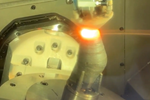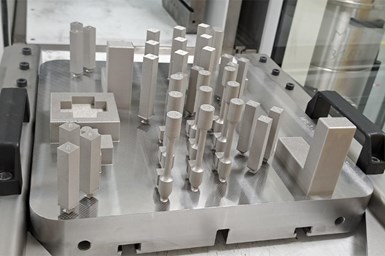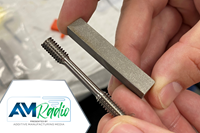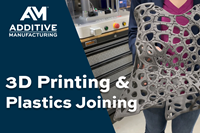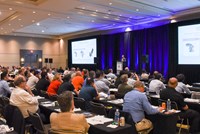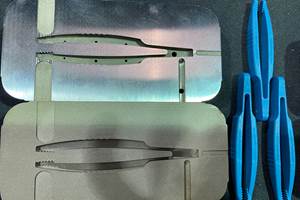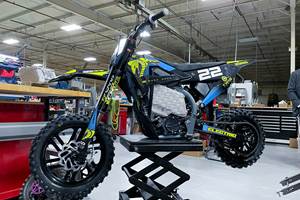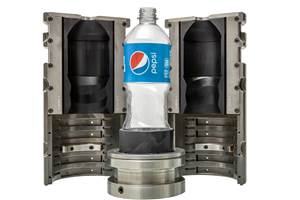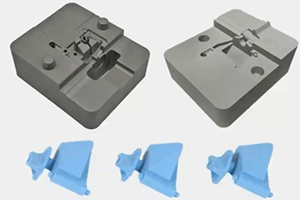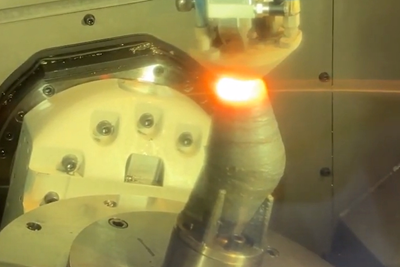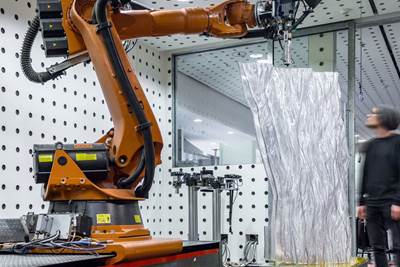AddUp, SSG to Introduce Tool Steel Optimized for Injection Molding Applications in Additive Manufacturing
SSG developed the Printdur HCT material to meet the requirements of injection molding, enabling manufacturers to significantly reduce production cycles using conformal cooling channels.
AddUp will soon be releasing Printdur HCT, a tool steel optimized for injection molding that meets all customer requirements such as corrosion resistance, hardness and wear resistance for injection molding applications.
The Printdur HCT was developed by Swiss Steel Group (SSG) based on the conventional standard tool steel 1.2083/AISI420 tailored for additive manufacturing (AM) with focus on powder bed fusion machines like AddUp’s FormUp 350. Following strict internal manufacturing readiness level protocols AddUp’s engineers were able to achieve up to 50% improvement in build speed without cracks and extremely low porosity, ensuring over 99.90% material density when compared to the standard material.
The company also says surfaces can be built up in excellent quality and without any smoke residue. The Printdur HCT material was designed for the requirements of injection molding and can significantly reduce production cycles using conformal cooling channels. Most of the internal cooling channels can be optimally built to a sufficiently good quality, without any support structures.
AddUp says it is committed to developing new materials for the tooling market and was excited to partner with SSG, one of the world’s producers of special steel long products, to collaborate on the development of Printdur HCT.
“Our goal is to use our decades of experience in the atomization and materials technology to design new materials for additive manufacturing,” says Dr. Horst Hill, head of the Special Materials Division at SSG. “The Printdur HCT utilizes the advantages of additive manufacturing to achieve the best material properties. We are very pleased that we have found a strong partner in the tooling sector in AddUp to establish new materials on the market.”
Because of an enhanced hardness range of 53-57 HRC and high wear resistance Printdur HCT offers an improved and longer service life for the mold inserts. With simple one-step heat treatment at 540°C, Printdur HCT achieves ~53HRC hardness and is ready to be used for injection molding applications because the material can withstand high temperatures without losing hardness.
Because the material is produced without nickel and cobalt, significant damage to the environment and the operator could be avoided. SSG, this year's winner of the German Sustainability Award, says it consciously focuses on high sustainability standards with its fully comprehensive powder recycling system. It is also one of the few companies that can already supply almost all products with a significantly reduced CO2 footprint as Green Steel. This has a particularly positive effect on the CO2 impact of its customers in Scope 3.
AddUp’s goal is to revolutionize injection molding applications and improve the efficiency of molds using AM. It expects the development of Printdur HCT and other tooling specific materials in its portfolio to support this mission. “At AddUp, we are committed to taking tooling molds to the next level using the FormUp 350,” says Julien Marcilly, AddUp CEO. “Our company’s history is deeply rooted in tooling applications thanks to our founding partners Michelin and Fives. It is through our experience and expertise in this industry that we continue to push the possibilities of additive manufacturing, proving it a more efficient and productive way to manufacture on an industrial scale.”
Printdur HCT’s manufacturing readiness level 3 has been achieved, which makes it ready for producing high quality proof of concepts. Currently being used on the FormUp 350 machine located at AddUp’s Tooling Competence Centre in Aachen, Germany, Printdur HCT is immediately available for prototyping and once fully developed will be available for end-use production parts.
Related Content
3D Printing Enables Mold Shop to Rapidly Prototype Medical Parts (Video)
A case study involving Mantle’s 3D printing technology allowed moldmaker Westminster Tool to go from design to injection molded prototype medical parts in three weeks.
Read MoreNew Electric Dirt Bike Is Designed for Molding, but Produced Through 3D Printing (Includes Video)
Cobra Moto’s new all-electric youth motocross bike could not wait for mold tooling. Parts have been designed so they can be molded eventually, but to get the bike to market, the production method now is additive manufacturing.
Read MoreHow Hybrid Tooling — Part 3D Printed, Part Metal Shell — Accelerates Product Development and Sustainability for PepsiCo
The consumer products giant used to wait weeks and spend thousands on each iteration of a prototype blow mold. Now, new blow molds are available in days and cost just a few hundred dollars.
Read MoreNicolet Plastics Succeeds Using Mantle's Hybrid Metal 3D Printing Method for Mold Tooling
A recent webinar explores Nicolet Plastics’ success using Trueshape Technology, Mantle’s approach to print injection mold tooling. The current challenges this technology addresses and alleviates in additive manufacturing confirms this method is effectively reducing lead times and cost constraints, while producing better inserts.
Read MoreRead Next
At General Atomics, Do Unmanned Aerial Systems Reveal the Future of Aircraft Manufacturing?
The maker of the Predator and SkyGuardian remote aircraft can implement additive manufacturing more rapidly and widely than the makers of other types of planes. The role of 3D printing in current and future UAS components hints at how far AM can go to save cost and time in aircraft production and design.
Read MoreHybrid Additive Manufacturing Machine Tools Continue to Make Gains (Includes Video)
The hybrid machine tool is an idea that continues to advance. Two important developments of recent years expand the possibilities for this platform.
Read More3D Printing Brings Sustainability, Accessibility to Glass Manufacturing
Australian startup Maple Glass Printing has developed a process for extruding glass into artwork, lab implements and architectural elements. Along the way, the company has also found more efficient ways of recycling this material.
Read More


